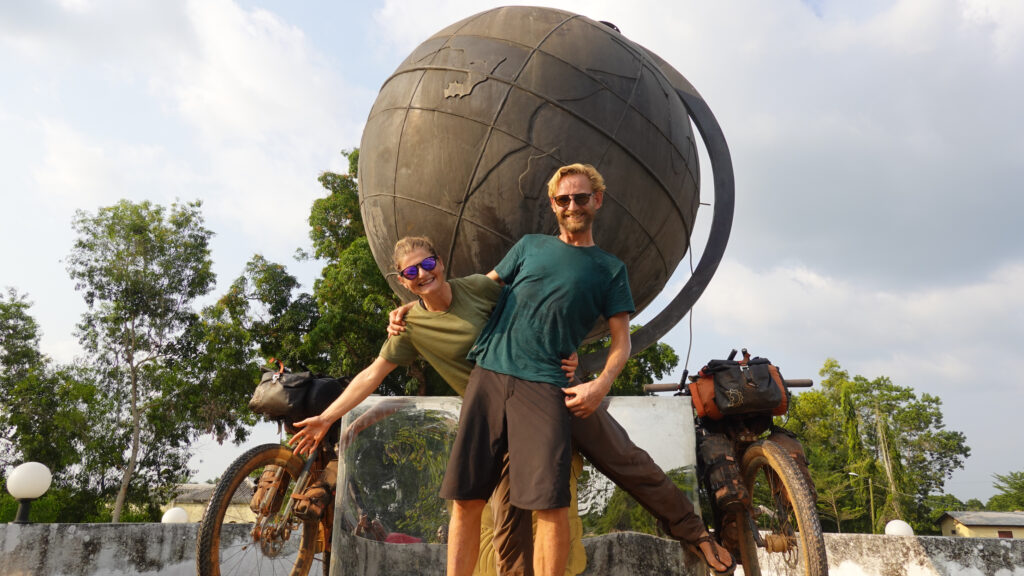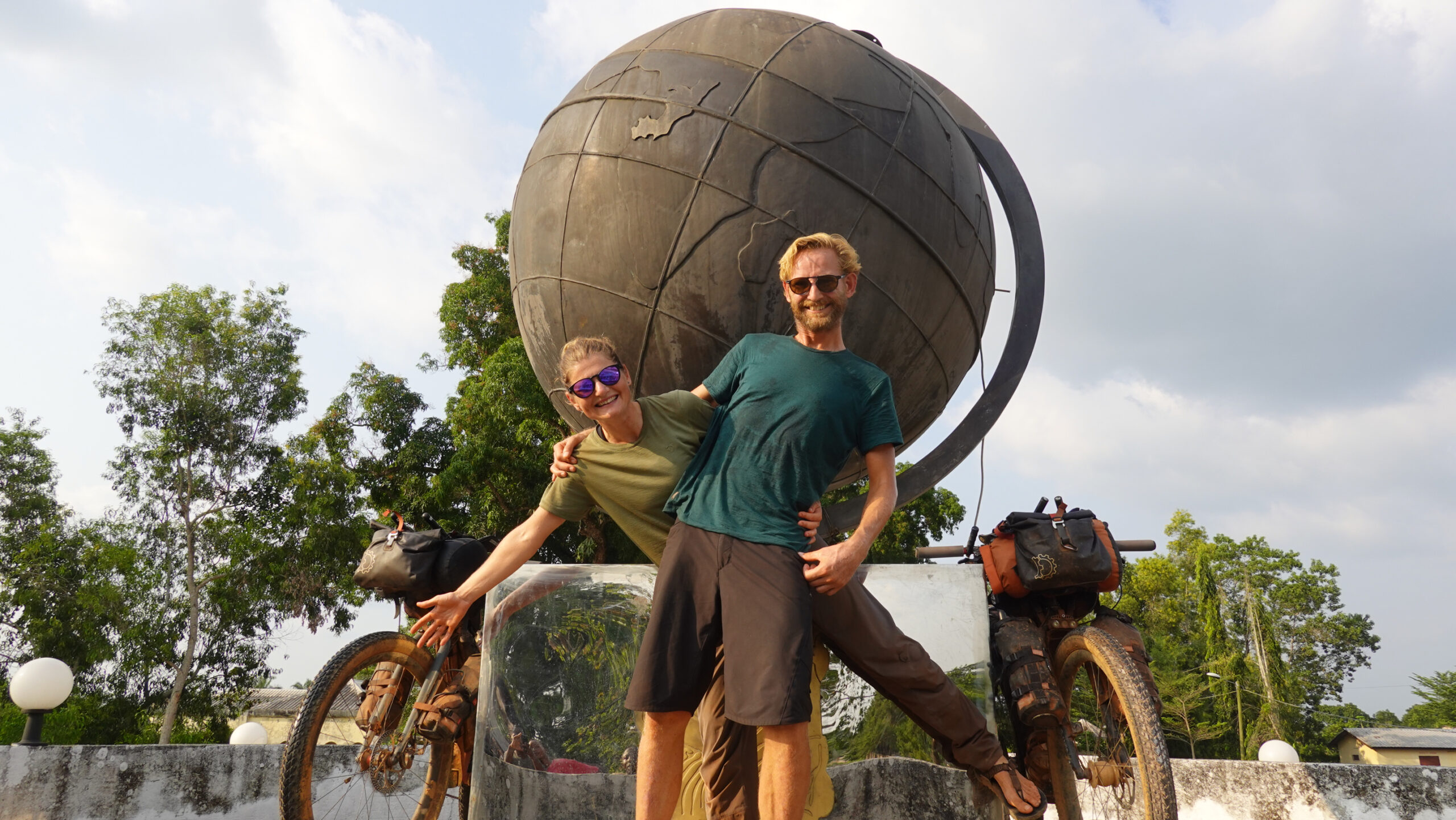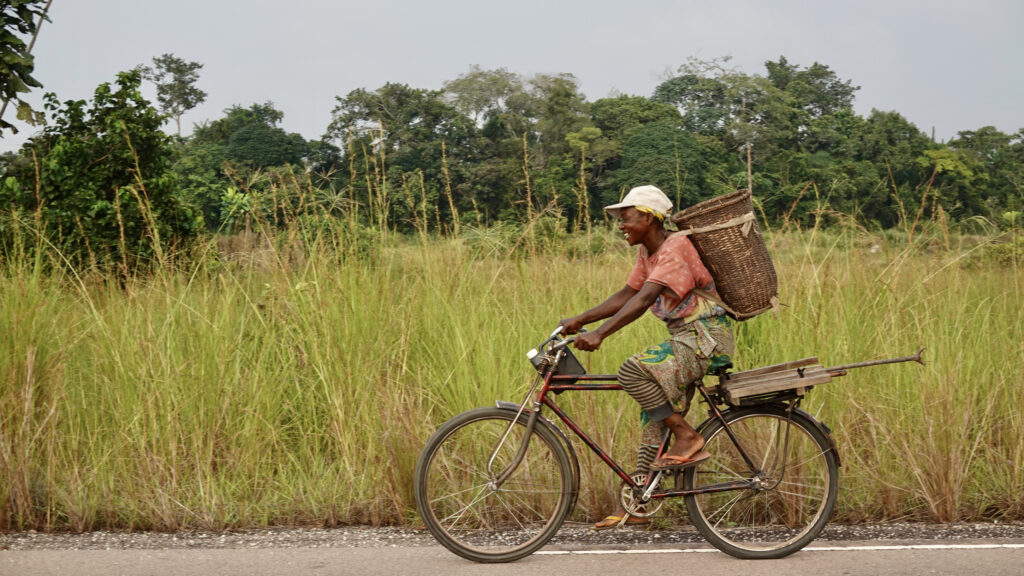
What country is Congo?
It has been almost impossible for us to find anything about the Republic of Congo in our research.
Every time we search the web, a lot comes up about the Democratic Republic of Congo - which is another country. Neighborland short story. But still another country.
No matter how much we try and refine our searches, we find very little information. So it is with butterflies in our stomachs that we settle into the small wooden canoe, which will sail us and the bikes a few hours down the Dja river, to cross the border to the Republic of Congo. In our passport we have a visa that we bought a long time ago, in Accra. Now we just need to go ashore in the small village of Ngbala and find an immigration office that can process our 30-day visa. It is going to be significantly different than we imagine.
As we approach the boatyard in the village, our two captains, who have paddled us quietly and safely down the river, set off the canoes. Inside the boatyard, a naked woman is standing bathing in the river, so we wait a while until she has wrapped a shawl around her body. Then we add.
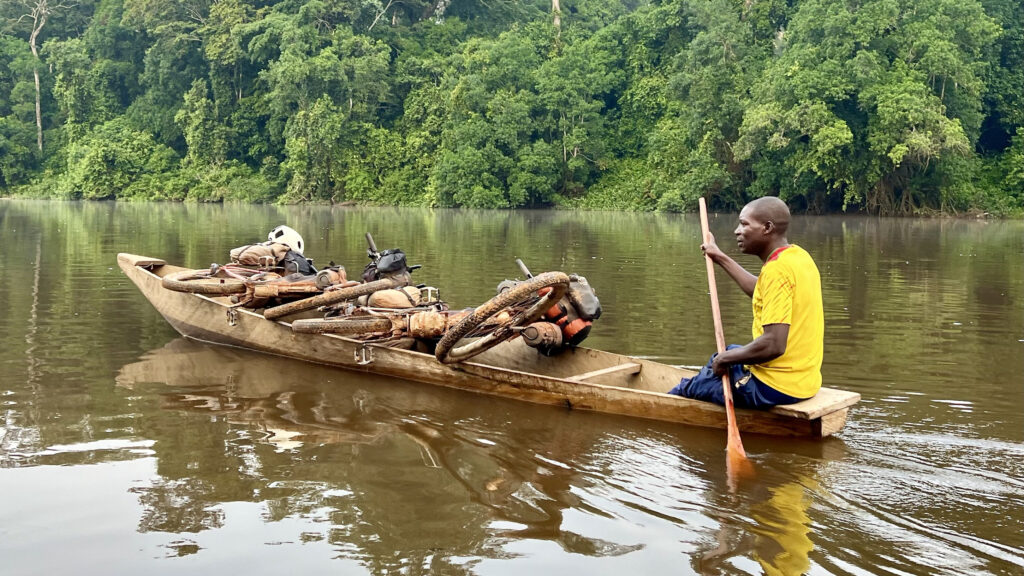
The first impression
In the small town we quickly find the police station. The police chief arrives on a motorcycle, in an Adidas tracksuit and large sunglasses. We have seen it several times before on the continent. You can always tell the police chief by that outfit. The higher the rank, the more training clothes.
He is friendly and notes our presence in Congo, but tells us that we can only get the stamp in the passport at a checkpoint out by the main road, 70km from here.
We find a meal, which consists of boiled beans and deep-fried sweet buns, before we set the bikes in motion down the fine dirt road, through the jungle.
Our first impression of the Congo is good. It is much calmer here than in Cameroon. People don't call for us. It is neat and tidy here. People do more maintenance and building projects on their houses. They have planted flowers and hedges, even though they live in the jungle. Adults have made cool creative wooden bicycles for their children. Here oozes excess. And then it hits us – the absence of alcohol. No one is drunk here in the morning. As it dawns on us, it's crazy to consider what a difference it makes, from Cameroon to here. How much profit it gives if people don't drink all day long. People don't seem to have more money. But they definitely have more energy and joy. It also rubs off on the children, who are more trusting of us. And it rubs off on us.
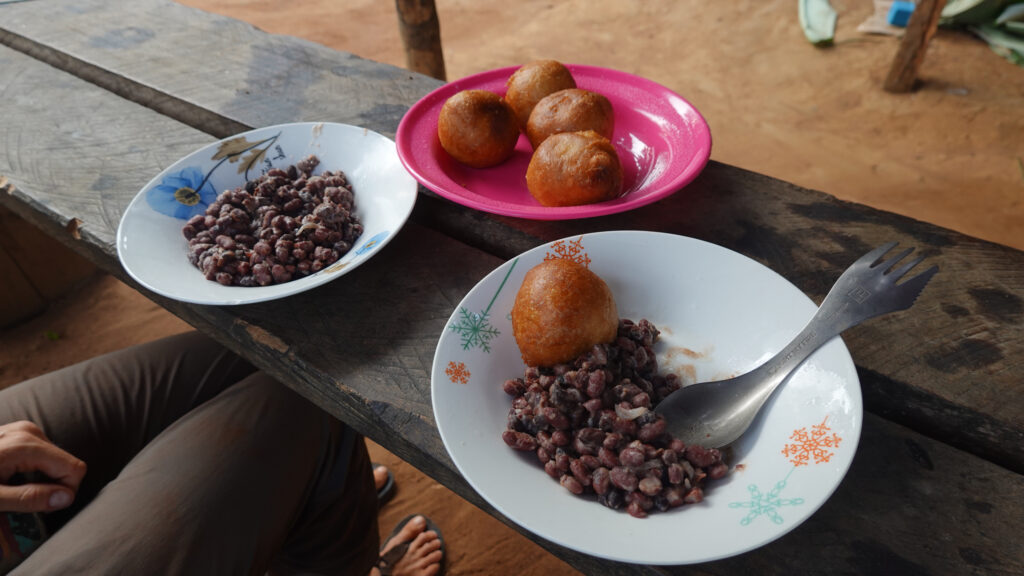
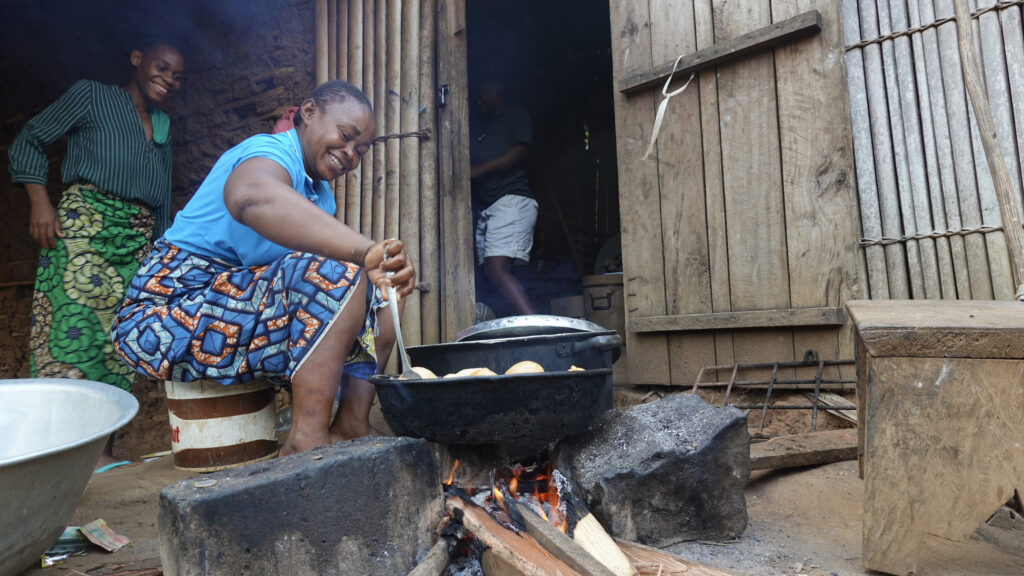
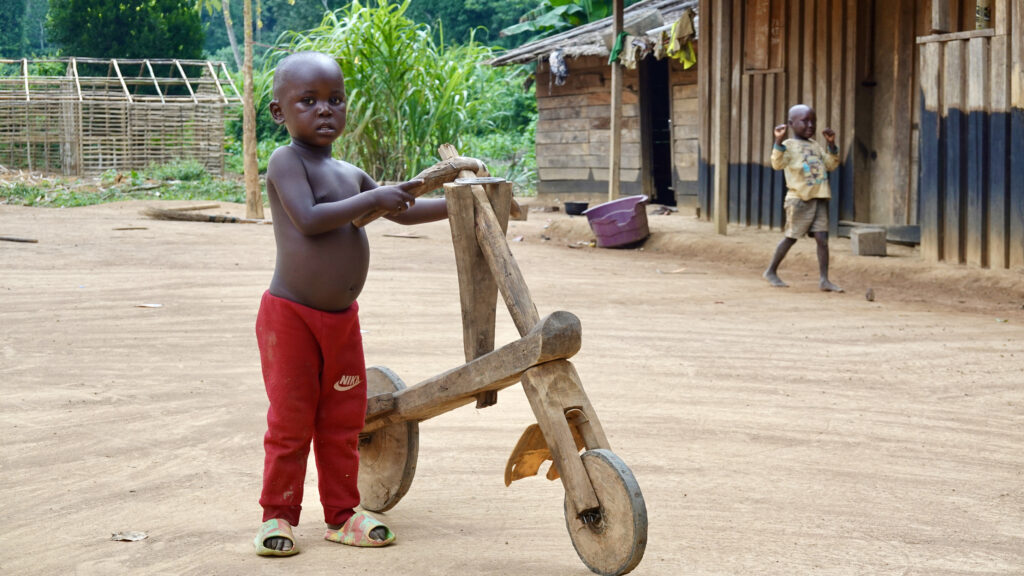
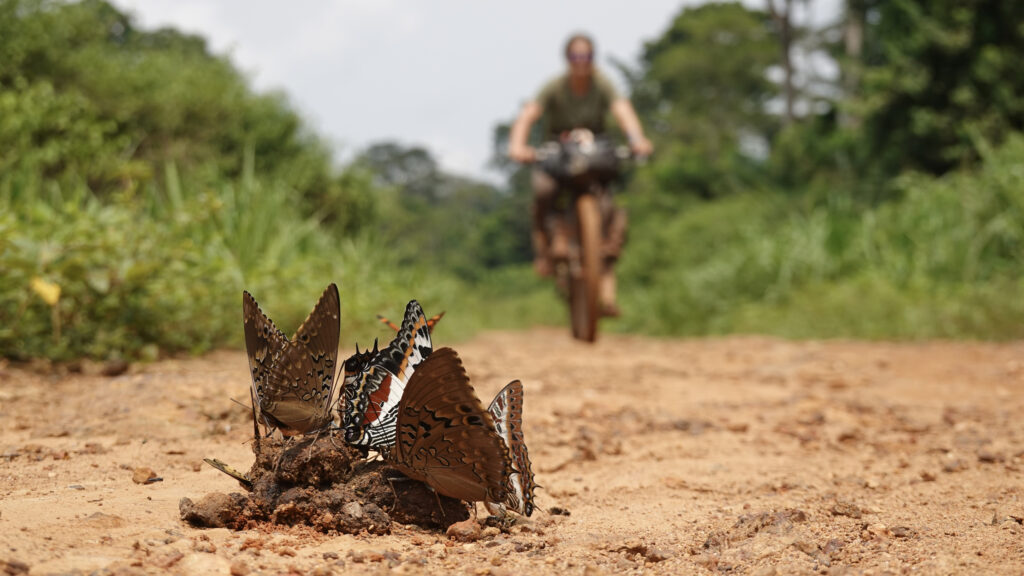
Mess with visas
When we hit the paved main road, we easily find the checkpoint where we can get our passports stamped. We have bought a visa for one month. The people at the checkpoint are very friendly, and incredibly talkative and curious, so it is almost impossible to keep talking about our visa, instead of answering the many questions about our bikes. But it dawns on us that we have roared it. We thought the visa would start the day we get it stamped. This has been the case in all the other countries on the route. But they tell us that the visa started on the date written in the passport, which is a few weeks ago. "You must be out of the country in 9 days" they say. That is on 30 June. We stand with our mouths open and polyps. "But, but, but..." we try to explain and tell and apologize and ask for more time. They call the head office in Ouesso and talk to the boss. As we understand it (in French), we just have to cycle there and they will stamp for us and give us 30 days. Phew. We breathe a sigh of relief and set off.
Ouesso is a small detour of 25km each way, from our direction. But we had planned a rest day or two there anyway, so it doesn't matter.
There are a few days of cycling to get there, but the country road is good asphalt and we get off just fine. When we finally find the immigration office at the port of Ouesso, no one has heard of the phone call from the checkpoint. But bad about it. They are getting ready to stamp the passport. The officer sits with the stamp in his hand, points to Marie and says: "Marie - will you give me some money for the stamp?". Marie replies coldly and briefly: "No". "Ok" is the answer, after which he stamps the passports immediately. If it works it works.
When we get the passports, we flip expectantly to the page with the stamp, to double-check our 30 days. The blood rushes from the face and we turn pale around the beak. They are adamant that we must be out on June 30. It's in 7 days. There are 850 km to the border.
Ow ow ow. This was not how we had dreamed of experiencing the Congo; With the head down between the shoulders and full speed on the bikes. It is not because it is not possible to cycle the 120km a day in the hilly landscape. But we had dreamed of rest days and time to experience small towns and gravel roads, wildlife and jungle. Instead, we must buckle down to reach it, and pray that we avoid accidents. But what hurts the most is that we had been looking forward to a few days in the capital Brazzaville, which seems to have something to offer. Especially in the form of coffee, cake and good food. But also museums and history.
Outside the immigration office, we decide to drown our sorrows in cinnamon snails at the town's bakery, before we have to spend the last light hours of the day drifting south again. Now the 50km detour suddenly became a bit annoying.
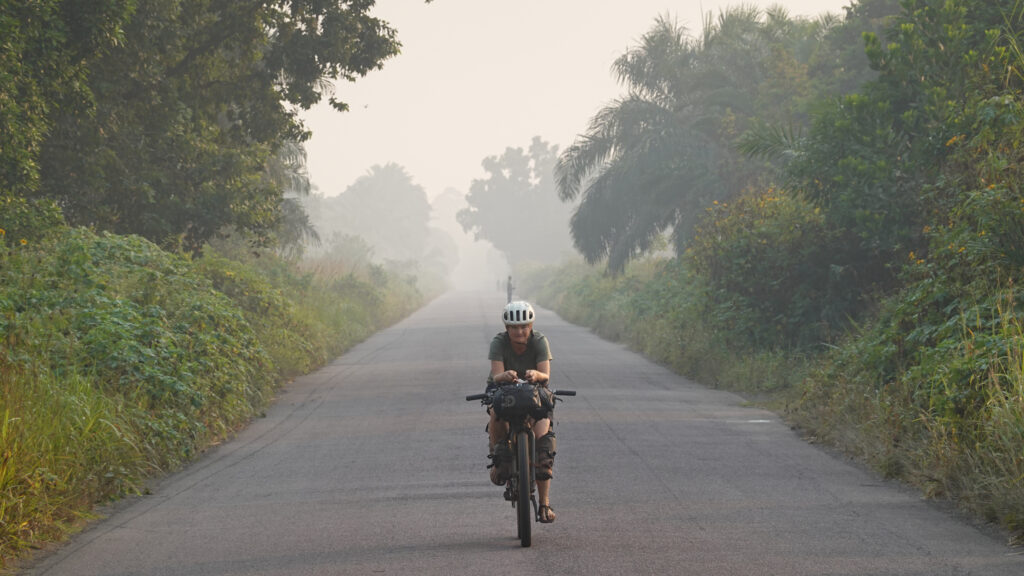
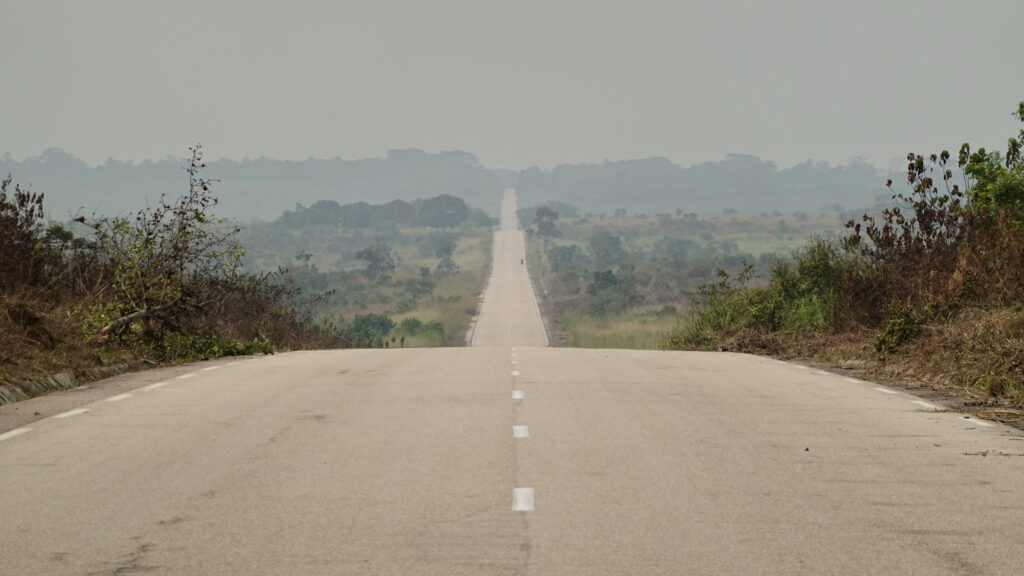
High speed = high combustion
The very next day we decide to pick up the pace. Instead of the 120km a day, we will drive 140km, so we at least have a whole day to experience Brazzaville. The asphalt is good for us. We take turns listening to podcasts, because Kenneth's headphones have broken. The pedals spin. But the headwind, the hills and a falling energy level make it harder than we had hoped for. Kenneth has gradually lost so many kilos that it doesn't take that much to slow down the system. The increased distances and the very few options for food drain faster than is good. The food is a chapter of its own. In the small villages we pass through, you can't get much to eat. In most places it is either a baguette with nutella, or a bun of fermented manioc, as well as a bit of meat in sauce. In most places the meat is bushmeat. It's a bit ambivalent for us, because you can actually say about bushmeat that it's super meat, because it's an animal that has lived freely in nature all its life. On the other hand, we know that the animals can carry diseases and the handling and cleanliness around the meat is sometimes a bit rough to witness. You never know what animal it is once it's in the pot, teeth and all. It could just as well be a rat as a deer.
When at one point we are sitting at a small street kitchen, out in the middle of the deserted country road, a small Toyota Corolla pulls up. 4 grown-up guys get out and open the trunk. A dead monkey falls to the ground. Kitchen nut comes to the trunk, which is stuffed to the brim with dead animals. We cannot distinguish the animals from each other as they lie there huddled together. The boys pull an arm here, a leg there. Something like a large chimpanzee with the face cut away. At the bottom is a small deer that Kitchen Nut would like to buy. One man pulls it by the leg, while the others push the animals on top back into the trunk, so that the whole meat orgy does not fall out of the car.
Kitchen nut takes off with the deer. One guy rinses his hands under the tap, they slam the trunk shut and drive on. We look down at the plate and are glad we chose the fish.
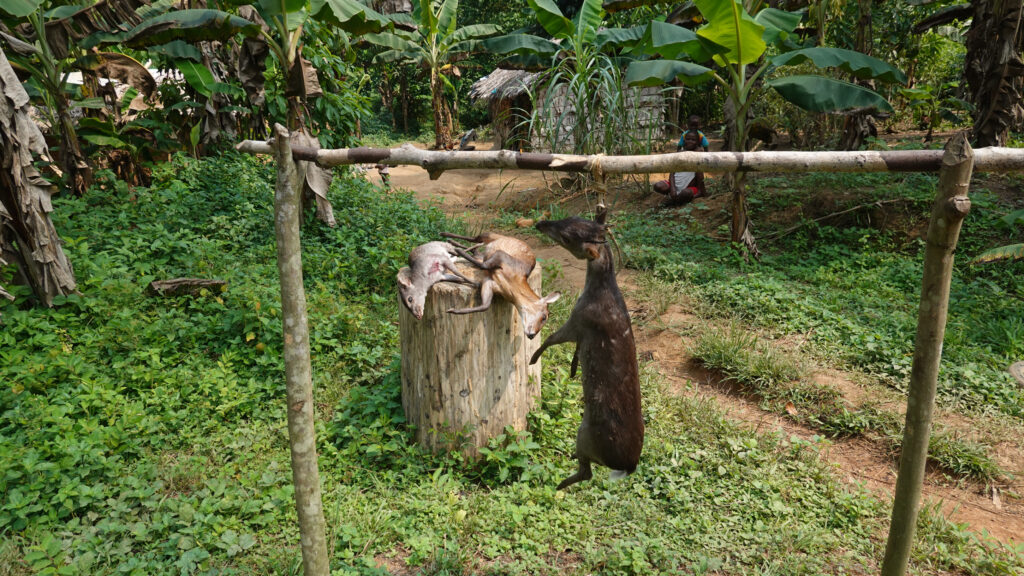
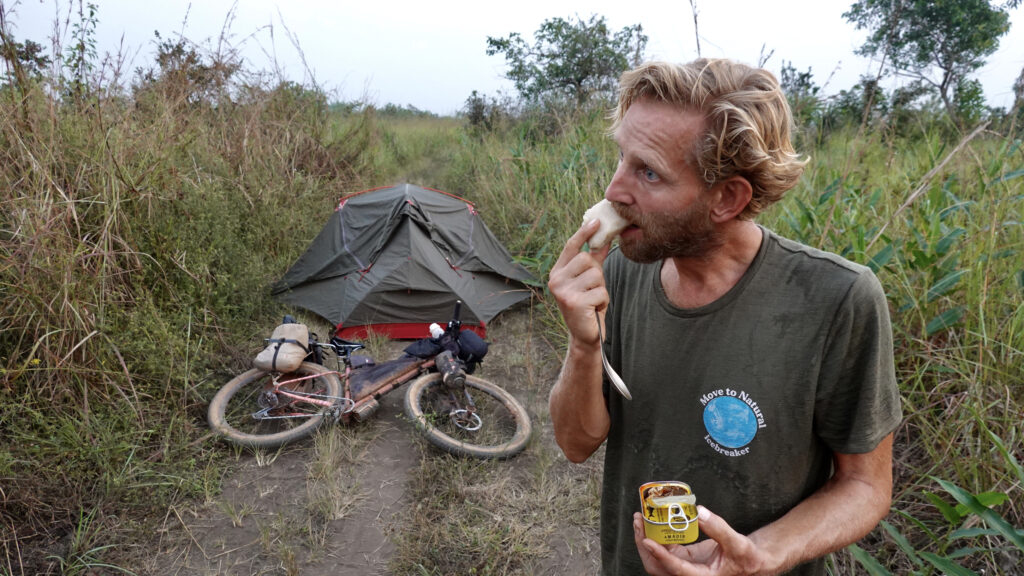
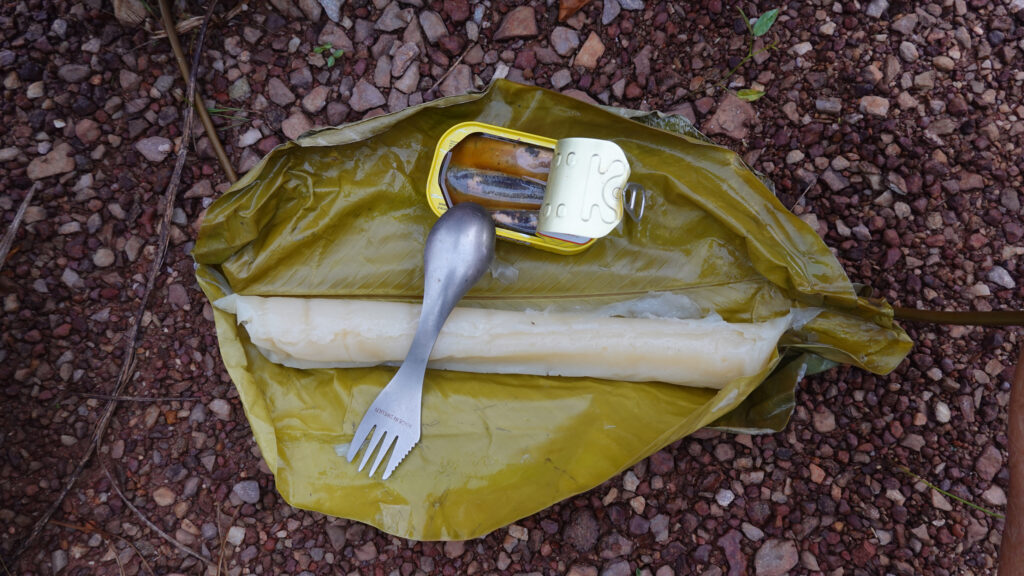
Live animals are better than dead ones
The next day we drive on a stretch where both elephants and gorillas are often seen. We scout and scout. Unfortunately, or fortunately, we see neither. Both animals are dangerous in the open, and we cannot run away from them on the bikes. On the other hand, we see a lot of small monkeys in the treetops. They send warning calls to the herd when they spot us.
In the late afternoon it gives us a jolt. We see three small dark figures step out onto the road. Like the Olsen Gang in miniature format, they quickly cross the road. There are 3 chimpanzees. We can't believe our eyes. The back chimpanzee stops on the side of the road and looks at us. It stands for a moment and watches us before it also disappears into the tall grass. Since a few seconds later we are there where they disappeared, we can't see anything. They're gone. But they left a happy impression on the heart.
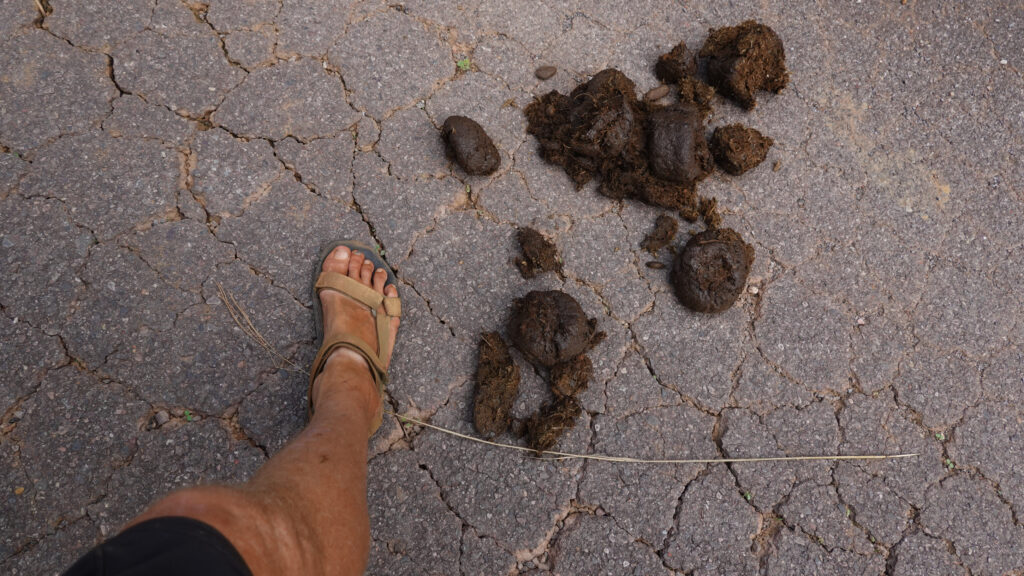
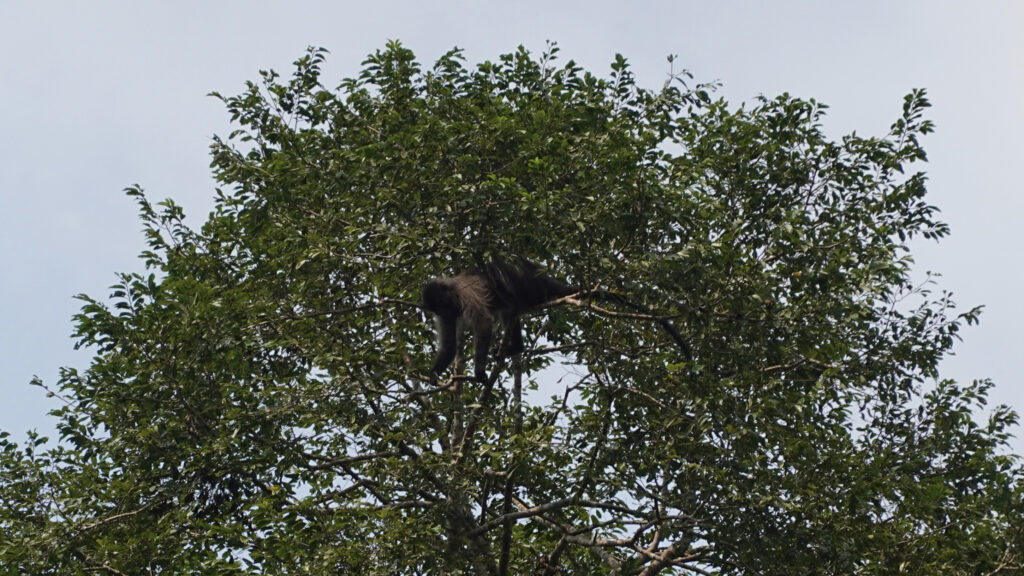
Rest day with a twist
Our plan succeeds and on the afternoon of the 28th we roll into Brazzaville. We find a Catholic mission and check in. We are happy but tired. Now we have earned a whole day off tomorrow, to experience the city before we have to cross the Congo River to Kinshasa, the 30th. The last day we have to be in the country.
We sleep long. Hangs out a bit over breakfast and agrees to skip the museums and just spend the day pampering yourself. Even though we came here to experience the city, the energy level is only for coffee and cake, at the city's best patisserie. Well deserved, we think. And it is also a success. But Kenneth hangs more and more as the day progresses and it becomes an almost unmanageable project just to find food to eat. We end up at the Catholic mission, where the nuns are kind enough to cook dinner for us. At night comes the culmination and the explanation. Kenneth wakes up shivering from the cold and an hour later he vomits in torrents.
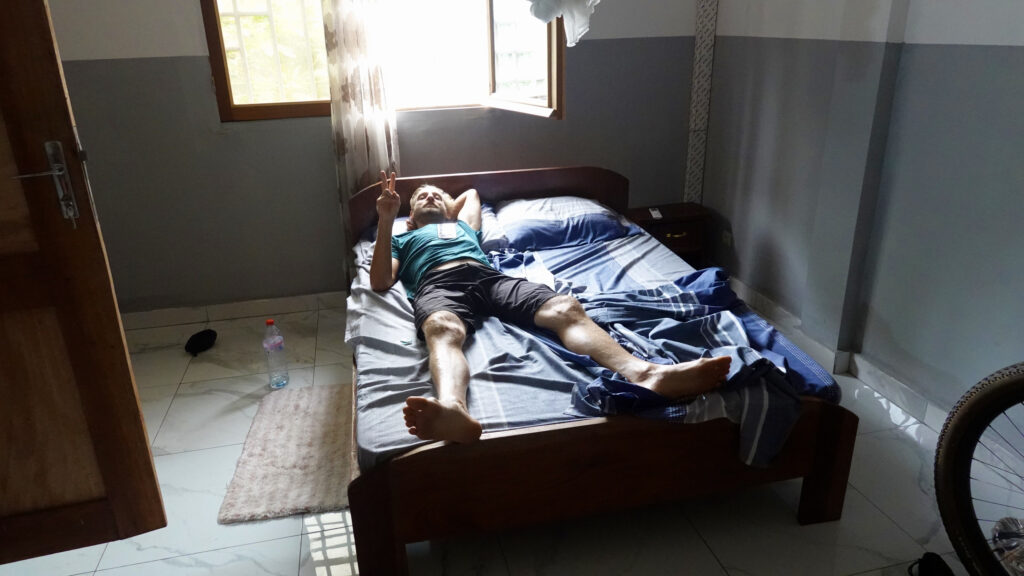
From Congo to Congo
In the morning he is dead as a herring. But we are stuck. Today we are going out of the country. Our visa is expiring. It takes Kenneth two long hours to pack his bike, with breaks in the fetal position on the bed. He is completely white in the head as we roll down to the quay, where we can take a motorboat across the Congo River and thus cross the border. Marie takes care of all the practical stuff, which is reasonably intense, with lots of hustlers yelling at each other as they each try to score the day's profit by misleading us. Marie navigates the chaotic human chaos with a sure hand and manages both stamps and tickets, without paying anyone for services we do not need. Meanwhile, Kenneth sits behind dark sunglasses on a red plastic chair in the shade and keeps an eye on the bikes.
On the opposite bank, there are just as many hustlers ready, but we gradually have a certain routine in dealing with these types of people. We use the bikes as a bulwark and effectively cut off the hustlers, one by one.
When we get inside the immigration building we are met with an unexpected and unfortunate sight. A medical check-up. At a desk sit two types who are clearly tired of their jobs. There is a thermometer on the table. Now it's about avoiding Kenneth being checked. Marie goes first and entertains. Kenneth uses all his energy to look happy and exuberant. It succeeds. We get rid of the thermometer as long as we disturb the two types as little as possible.
Then it goes to the hatch with passport stamping. We have a visa and everything is really just a matter of form. Until the lady behind the hatch asks Marie for money to stamp the passport. The answer is, as always, no. And then we get kicked out. We are told to leave the bikes behind and go with them into the office behind. We hide our nervousness, but have not yet been in a situation with the authorities that we couldn't get out of.
However, the boss in the office is in a brilliant mood and the whole thing will just be a matter of formality with a little extra paperwork to be filled in before he welcomes us to the Democratic Republic of the Congo.
Such!
But it's not over yet. As we are about to leave the building, we are stopped at another table where two men begin to write us a bill. But before we can even say anything, our assistant from the office shouts at them to leave us alone, and they reluctantly put down the pen. Another triumph for us.
It has all gone much easier than we had feared and we already have a good feeling about the new Congo that lies ahead of us.
We drive to a Catholic mission in town, where Kenneth passes out completely on the bed while Marie goes to get pizza.
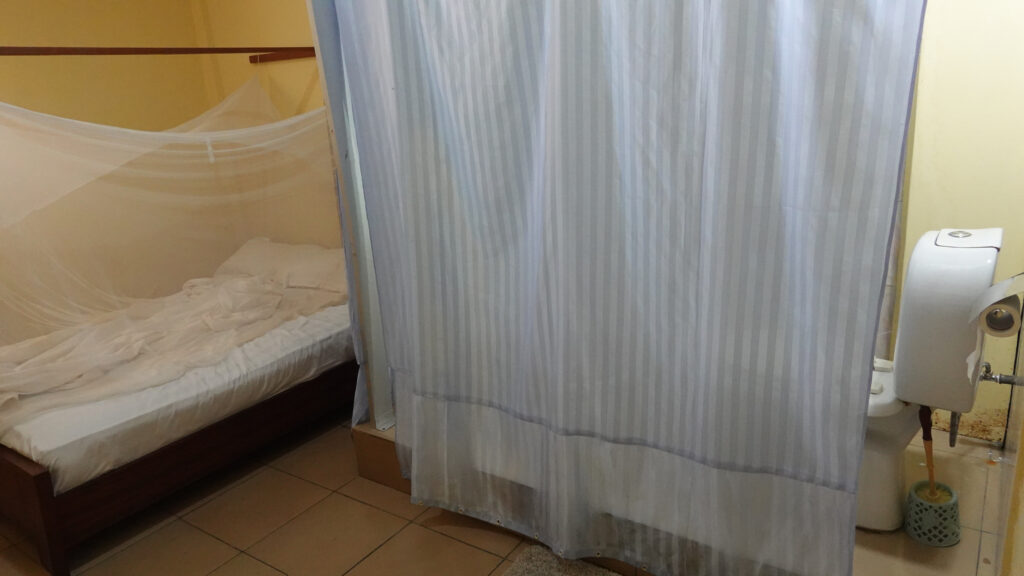
The Curse of the Congo
The Democratic Republic of Congo (DRC), on the other hand, has been easy to find information about. The country has a rather wild history filled with war, mutilation and cannibalism. It is too extensive to write about here, but it is pure horror to read about how the Belgian King Leopold was gifted the DRC, as his own personal country, when Europe sat down at a big desk in Berlin and divided Africa between them. How he has since mistreated the country and stripped it of values. It didn't get much better when the Europeans left the country and left it to the traumatized population's own care. The traces of dysfunctional systems can still be seen in one of the world's most corrupt countries.
Many like to highlight the Congo as a prime example of the "curse of having a lot of raw materials". Because that is exactly what Congo has. Diamonds, gold and special minerals that the whole world demands. Nowadays, this means that the neighboring countries are de facto stealing from the Congo's natural resources and benefiting greatly from the proceeds. A number of experts highlight the now well-functioning neighboring country Rwanda as a country that has built its welfare on raw materials stolen in the DRC.
But we don't buy the view that raw materials are a curse. In our view, the curse lies solely with the corrupt regime, which at all times enriches itself before protecting and developing its own country.
Allow us to highlight Norway as a country that is not particularly cursed by their raw materials. The international community is more than willing to support and help governments in Africa to develop, but time and time again the money disappears into deep pockets. That is the sad reality.
Another trip to the hospital
The day after we arrived in Kinshasa, Kenneth still hasn't come to the hooks. The insurance company finds us a hospital, at the other end of town. We jump on the bikes and cross the intense metropolis with a cloth over our mouths, to avoid the thick black traffic that fouls the air. It's intense. There are thousands of battered yellow taxis that drive completely as they see fit. The bulges testify that they do not hold back from anyone or anything. We are the soft road users and take our precautions.
We stop at a bank on the way. Kenneth agrees to exchange money. It looks like the back room of an illegal gambling den. In the small office, the desk overflows with checks and receipts, as well as a cash counter. The banker's Swiss watch is carelessly placed by the armored window so that the customer cannot avoid seeing it. On the floor is a cubic meter stack of banknotes. On small side tables are suitcases full of cash. The Congolese CDF is not worth much and most people prefer to trade in dollars. Yet.
Outside, Marie also experiences a scene worthy of a film.
The security guards in front of the bank have Kalashnikovs over their shoulders, and at the same time they make a dash for their noses. The eyes dart around in their heads as a large black SUV pulls up right in front of the door. A giant loaf in military clothing and sunglasses, with knee pads and elbow pads jumps out of the car with an even bigger gun. He looks a lot like Rambo. He opens the door to a big fat man in a suit who has to do banking business.
We agree that the DRC is the Italy of Africa. Mafia, corruption, drugs and guns everywhere.
Without further health challenges, we arrive at the hospital where the usual blood tests are ordered. All tests are negative. However, the doctor can see that the infection rate is high. So something is not quite as it should be. But he can't know what it is, so we start with a worming treatment. Incidentally, he recommends it every three months while we are in Africa.
Our rescuer Kamil
We are invited to stay for a few days with a guy called Kamil. We got in touch with him, through our friend Charlie, who has a project where he goes through Africa to raise money to build wells in areas in need. (Read more at walking4water or Charlie walks for water). Charlie has lived with Kamil for a month, but has just returned home to Denmark, the day before we arrive in Kinshasa. Too bad we didn't get to meet him. On the other hand, "his" room became available, at Kamil's, and we can now stay there for a few days.
Kinshasa is extremely expensive to live in, so we are deeply grateful to be able to save some money while Kenneth recovers. But it is not the economy that is most important. The meeting with Kamil and his brother Kaif is really interesting. Kamil is of Indian descent but grew up in Tanzania and has lived the last 18 years in Kinshasa. He is a businessman with many connections and a great overview of news and the world situation. Every day, his TV shows alternating news from TV stations all over the world. Kamil and Kaif are fun to talk to and they are good sources of knowledge about the situation in the DRC. In particular, they talk about the many corruption cases and coup attempts in the country. We benefit from their great hospitality and are deeply grateful.
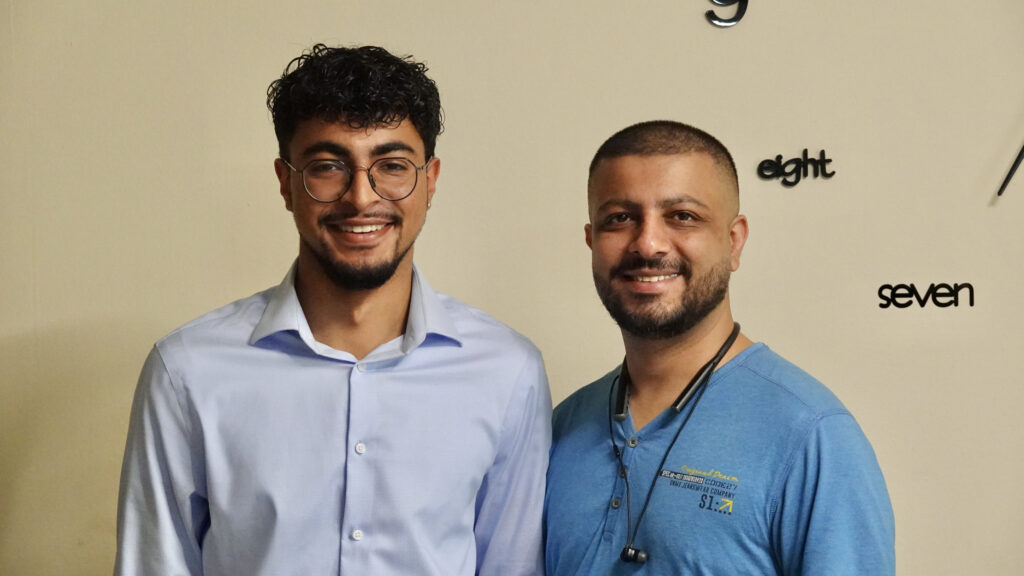
Hospital upgrade
Although we have some good and quiet days with Kamil and Kaif, Kenneth is still not at his best, as we have to move out and make room for Kamil's roommate, who is returning home from summer vacation.
The insurance company has "upgraded" the treatment and moved us to a first priority hospital, which is just around the corner. Thank you for first sending us to a low priority hospital, at the other end of town.
Be that as it may, Kenneth will again have a brain scan, as well as more blood tests. Everything is negative. The number of infections has also been reduced after a vigorous course of antibiotics. The last option is to check the eyesight. The hospital's ophthalmologist finds a large deviation in the vision compared to the contact lenses Kenneth uses. It requires immediate new glasses and is definitely the cause of the headache, which has lasted two months. New glasses can be bought immediately, at the hospital.
However, the deviation in vision is so great that Kenneth finds it suspicious and goes to an optician instead, who, using completely modern measuring equipment, finds that the vision fits perfectly with the contact lenses.
It seems that the headache that came on by itself must go away on its own.
Onward into the world
We are moving to another Catholic mission because we have to give Kenneth complete rest for a few days. It helps, but it's slow. On the other hand, spending money goes quickly. We spend 4-5 times our budget per day. Kinshasa is the world's second most expensive city to live in for expats. After Luanda in Angola. But after 5 days of complete rest and reasonably nutritious food, we're at the point where it's better to sit on a bike than stare at a wall.
We depart from Kinshasa. We have planned short day stages of 70-80km so that we do not use too much energy. The challenge is still to get enough nutrition. The street kitchens cannot supply the necessary energy that Kenneth needs. And we have become a bit cautious about eating on the street, because the DRC is notorious for stomach problems. We cook dinner ourselves again. It helps a little and during the four days we spend cycling to the border with Angola, Kenneth gets a little more used to the hooks.
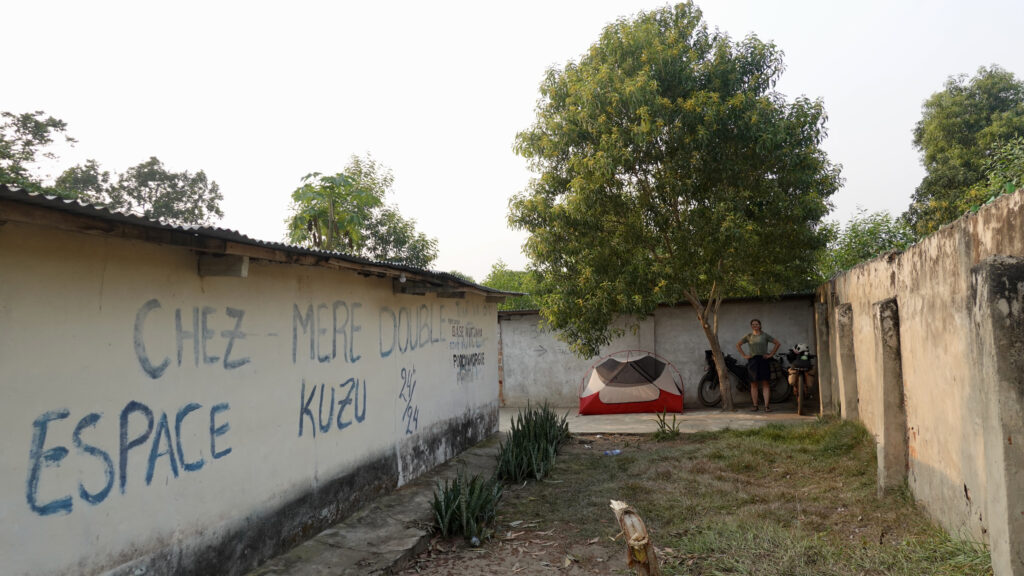
On the trip through the country, we have the great privilege of driving on asphalt. It is a privilege because the DRC reportedly has less than 2,000km of asphalt in the entire country. A country the size of Western Europe.
On the other hand, the traffic is completely out of control on the country road. We write an SMS to Kamil and ask if you need a driver's license in the Congo? He replies that it has been 6 years since the government stopped issuing driving licences. You can feel that. Apart from the risky driving on the narrow country road, everything on wheels is consistently overloaded to new heights. Literally. We saw a car with a yellow cock's comb. The driver had tied 8 layers of yellow 30l plastic cans on the roof, and all the way down over the boot. 8 layers! Many cars have a load that is 2-3 times higher than the car itself. Often there are people sitting on top of the load. On trucks, people often sit up on the bed, or even on top of the container. In the passenger cars, people sit in the trunk, which is held open with a branch, while their feet dangle dangerously close to the asphalt. We've seen overloaded vehicles before, but in the DRC it's wild.
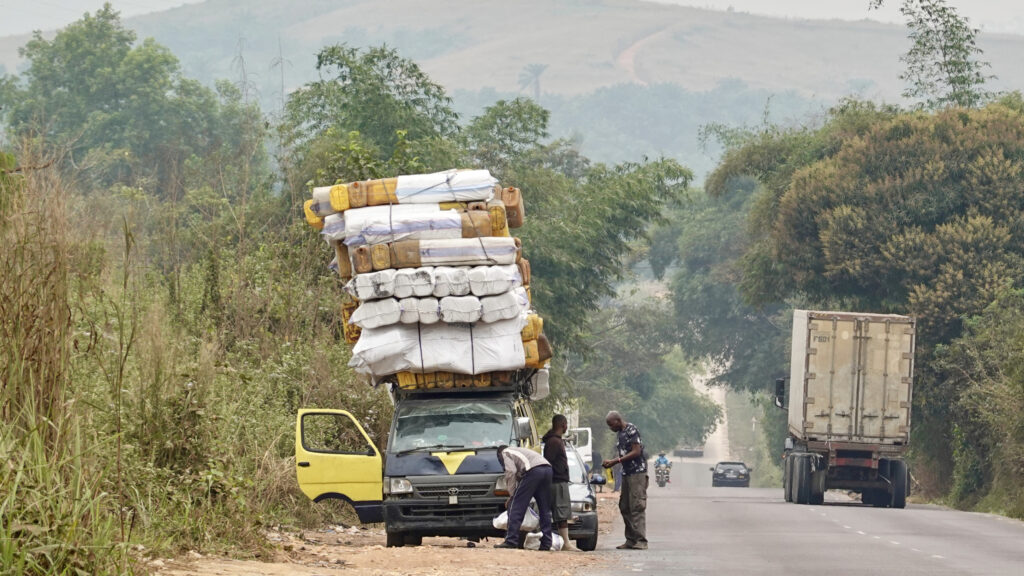
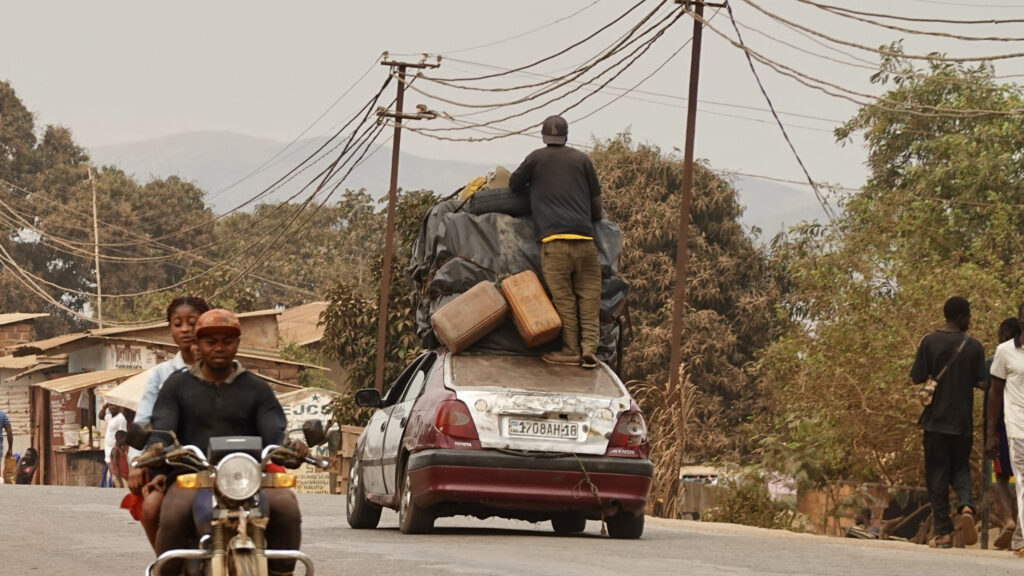
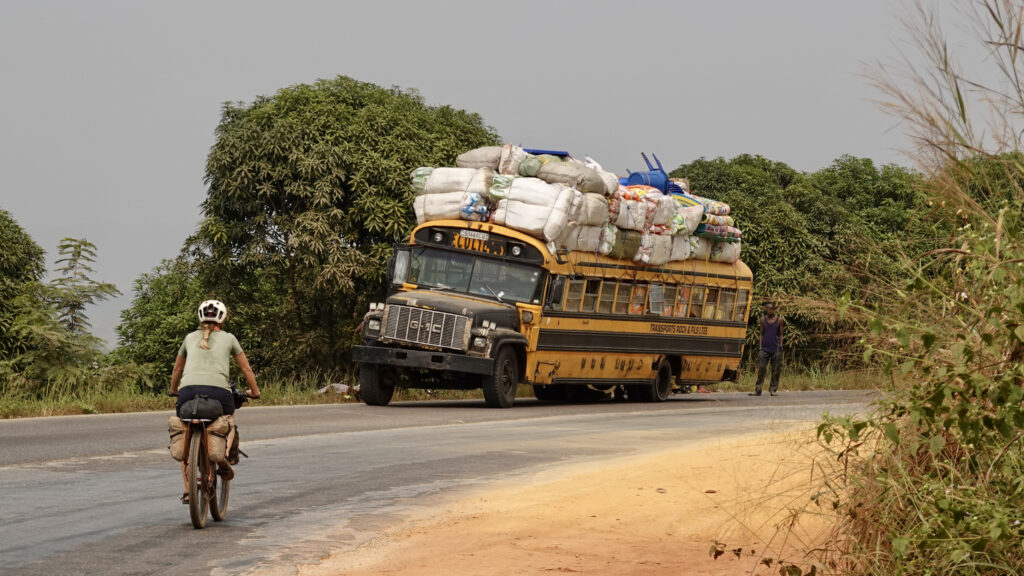
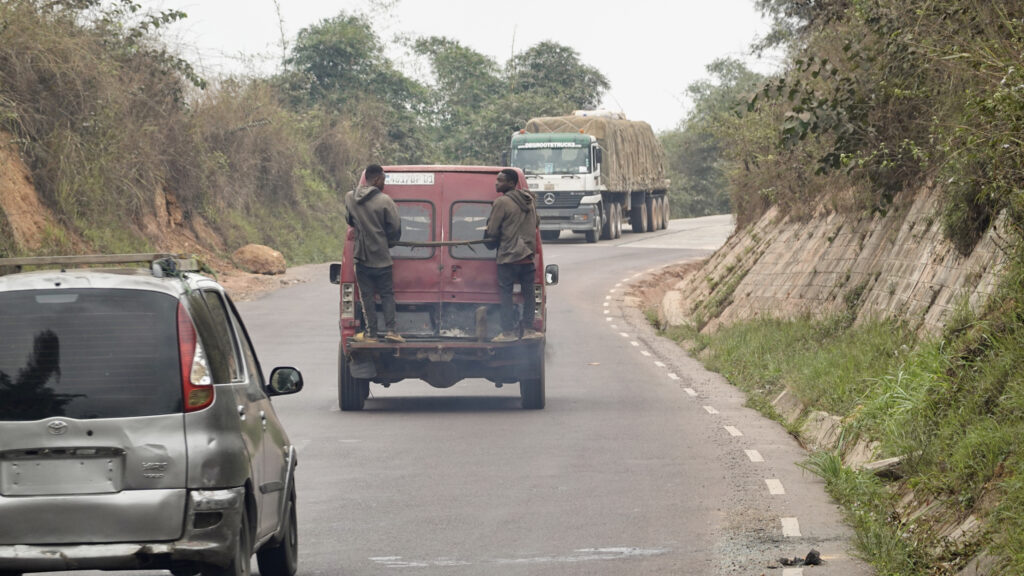
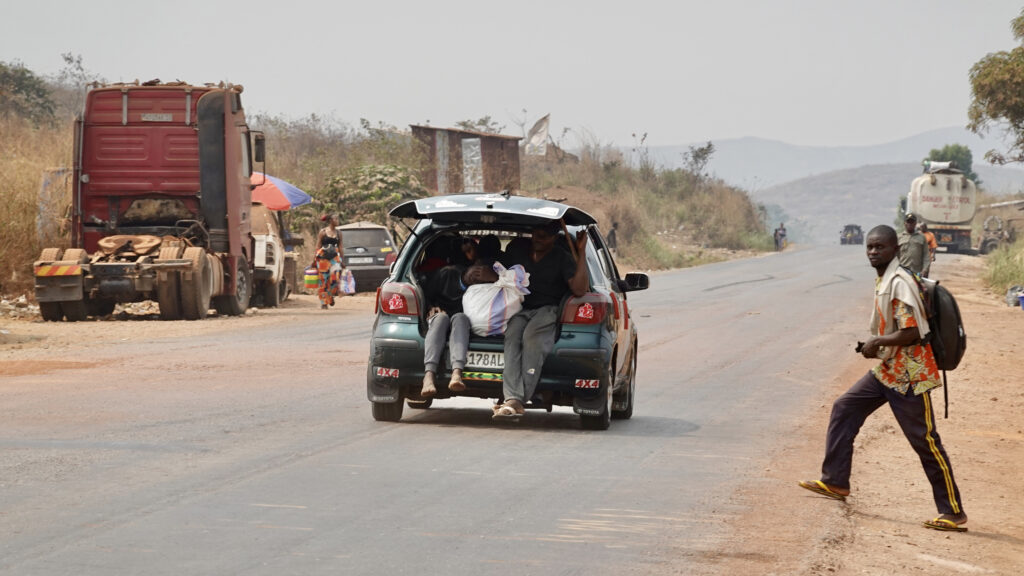
If it works it works
People are nice though. They smile and wave. And extends his hand to ask for money. Or a smoke. You can see it's a reflex. Most are not very persistent. It is clearly opportunistic. If it works it works. But we understand where it comes from. People here live from day to day. It is clear that the country is completely on its knees. People have nothing. Dirt is everywhere here. No one has the time or energy to do anything extra. Everyone is looking for what is needed to survive today. Nobody thinks about tomorrow. It is an approach to life that trickles down through the entire system from the top. It's sad to see. But understanding helps us not to jump in the air when a man puts out his hand for the 117th time.
After 3 days on the road we reach the border town of Lufo. We have agreed to take a rest day before crossing the border into Angola. Kenneth is now completely healthy again. The mood has returned and the food slides down better. The headache which has lasted for 3 months, since Lagos, is now finally gone.
Once we cross the border to Angola, we get busy and then we can no longer drive short daily distances. We only get 30-day visas at the border. In return, we have to drive around 2500 challenging kilometers through the country. Quite a bit more than we usually drive. This again gives us too little time to explore the curvy corners as we would like. But on the other hand, we are also ready for the big change that lies ahead of us in southern Angola, where the transition to the desert and the desolate landscapes devoid of people begins.
But here in Lufo, we just take a break and focus on eating some food. The street kitchens again have slightly more nutritious meals and we eat beans, fried bananas and chicken. We just get a flick of the tail from the DRC.
When we rolled into town we stopped at a cozy street kitchen. The woman was super nice and sent her daughter off to get soda for us. We gave her a 20,000cdf (50kr) banknote with which she could pay. As so often before. But when we had to pay for the meal, the lady had completely forgotten that we had already given a large bill. Only when a couple of other young men nearby intervened did she think about the payment. We then got 2,000cdf back. Which was totally wrong. It required a huge discussion and many rounds and calculations before she would admit that we had only bought for 11,000cdf. In the middle of the chaotic discussion, which now involved about 10 people, a young man started begging Kenneth for cigarettes. It cannot be ruled out that Kenneth shouted: “Are you fu…. kidding me?!”. Congolese certainly thrive in chaos, noise and loudness. Significantly more than Danes. The icing on the cake came when we hopped on the bikes and a young man wanted to take a selfie with Marie, who said no. He turned the camera and wanted to take a picture of her from behind anyway, prompting Kenneth to take the phone out of his hand and give some verbal slaps. It was a small, albeit pathetic victory, as Kenneth cycled off with the phone in hand and the young man had to run after him to steal it back.
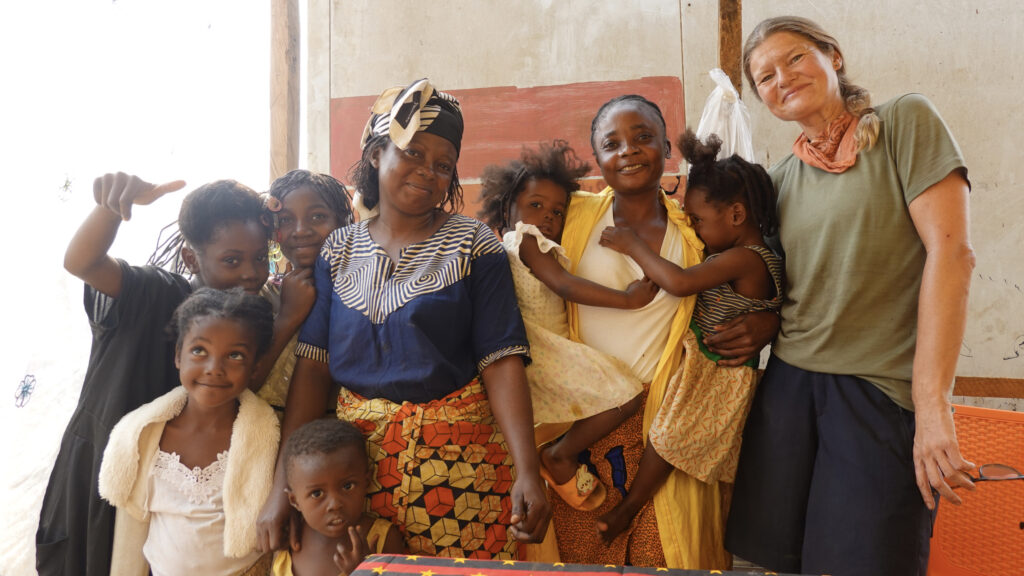
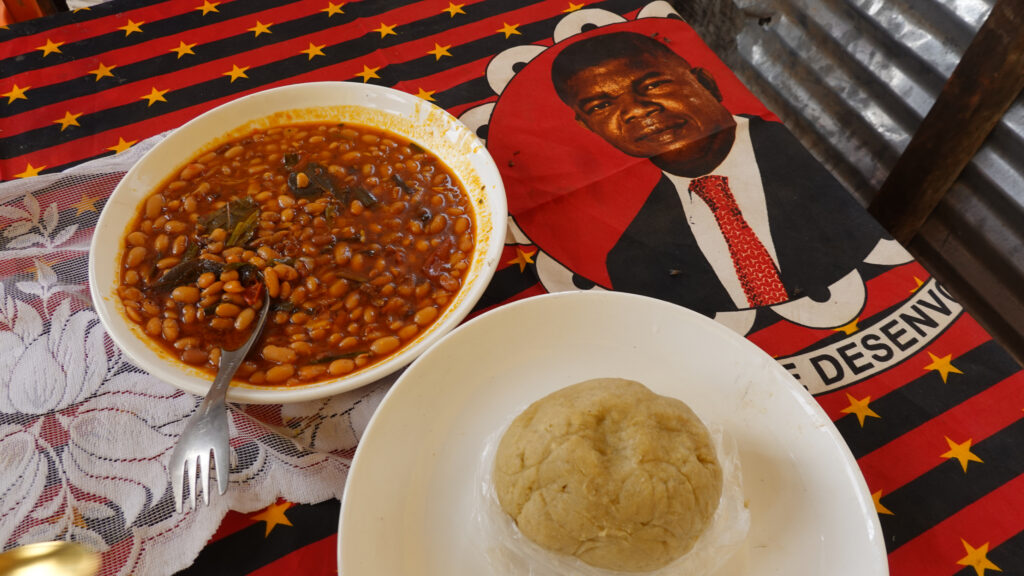
On the way to our hotel, we stop to buy oranges. Kenneth asks how much they cost. The answer is "1,000 per piece". Kenneth points to the sign in front of the oranges where it says 500 and laughs at the lady. She doesn't know what face to make and tries to wipe it off on the other ladies behind the stall. Kenneth gives her 2,000 for 4 and all is well.
In the evening we found another street kitchen, with some other nice ladies. They had good food and we returned on our rest day and had lunch. And again in the evening, for dinner. They got cuter and cuter. The dinner was 6,000cdf and Kenneth gave a brand new 20,000cdf note, as well as a 1,000cdf. But she didn't want the small note, which otherwise made sense in terms of change. When we had to leave, we asked for the change, but then there was another discussion about it. Again a couple of young boys came to help. Which just made it all the more chaotic. We agreed that the food should cost 6,000cdf. But we did not agree on whether we had already paid. The lady refused. Finally the other woman pulled out a note and said we had paid with it. Small victory for us. But it turned out to be an old 5,000cdf note. Not the brand new 20,000cdf note that we had paid with. The old note has the same color as the new 20,000cdf. Cheating and deception. It's probably not the first time they've done the trick. But no matter how much we complained, they wouldn't give up.
In the end, we have to survive, and they definitely need the money more than we do. And they are the ones who have to live with deception. Not us.
But it's crazy to experience that people here can look someone in the eye, smile, and then stick the knife in without it touching them in the slightest.
If it works it works.
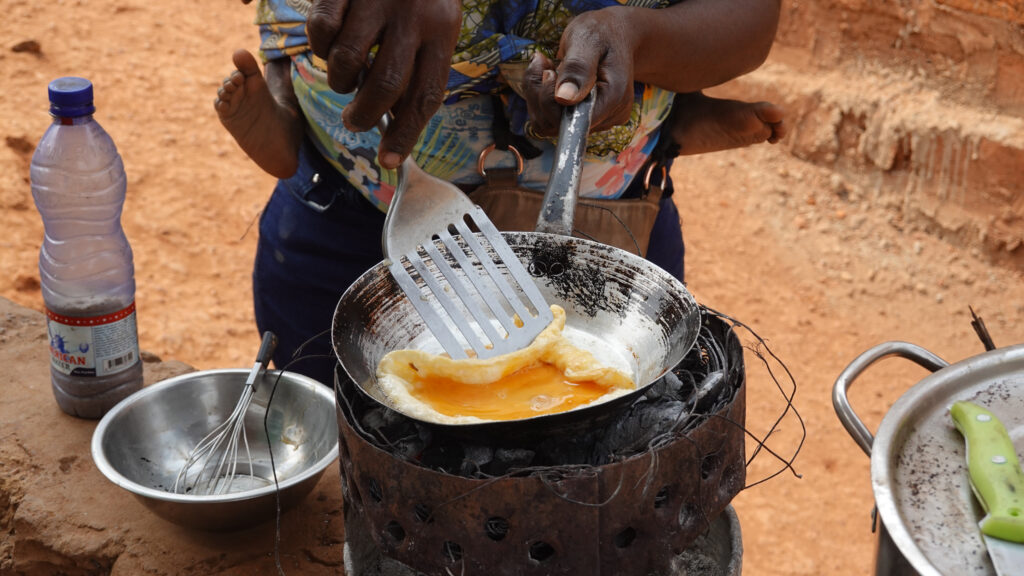
Again, you would rather pocket the money you can steal today than the money you can earn honestly tomorrow. Congo's core problem with both high and low. In the street kitchen and in the government offices.
Congo is a wild country that we would have liked to have experienced much more of. But the security situation is far too uncertain. We felt safe throughout, but we also moved in a rather narrow but safe corridor through the country. We have seen desperation, powerlessness and lawlessness. But we know that in other parts of the country, it is even wilder. It's absolutely insane to think how stressed the people are who live here. We are privileged and can only cycle across the border to Angola. New country – new experiences. But for the people who live here, Congo's desperation is a reality they cannot escape.
